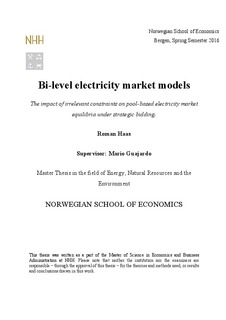Bi-level electricity market models : the impact of irrelevant constraints on pool-based electricity mrket equilibria under strategic bidding
Master thesis
Permanent lenke
http://hdl.handle.net/11250/2403440Utgivelsesdato
2016Metadata
Vis full innførselSamlinger
- Master Thesis [4372]
Sammendrag
Advancements in optimization solvers lead to an increased use of complex bi-level problems
(BLP) in operations research (OR). For electricity market modelling, BLPs are applied to
simulate physical pool-based markets which include transmission constraints. Equilibrium
problems with equilibrium constraints (EPEC) are thereby a specific form of BLPs which
allow to incorporate several strategically operating market participants in one model.
However, there is an inherent risk involved with BLP optimization techniques in general.
Irrelevant constraints (IC) can negate the optimality of the solution and thus void the
equilibrium. Even though EPECs are used in academia and industry, research on this
mathematical phenomena called independency of irrelevant constraints (IIC) is limited and we
have no knowledge about the impact of ICs on complex electricity market EPECs.
The aim of this thesis is to verify if such EPECs are IIC and gain insight on how ICs could
affect electricity market equilibria. A specifically developed process, based on the
mathematical principles of the phenomena, is used to numerically identify ICs. In order to
verify how ICs impact optimality under different market settings, several scenarios are applied
in a test environment. Focus is put on the impact of objective functions, subsets of ICs,
strategic bidding and the effect of ICs on producer bidding behaviour in day-ahead auctions.
It could by shown that the implemented EPEC model is not IIC and that the equilibrium
changed, once an IC was rendered active. The introduced three step process proved as reliable
approach and four factors were recognised as relevant for the effect on the voided equilibrium.
To emphasize practical significance, the thesis also provides a numerical scenario that
demonstrates the implications of ICs for electricity market applications and OR.
Consequently, the findings of this thesis add to the general understanding of ICs and build a
solid foundation for future research on the IIC property.
